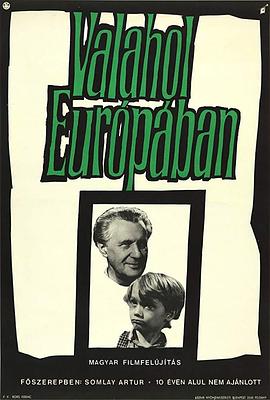百度云
影片详情
影片名称:欧洲的某个地方又名:ouzhoudemougedifang清晰度:更新HD中字
影片演员:Artúr,Somlay,Miklós,Gábor,Zsuzsa,Bánki
影片导演:Radványi,Géza上映时间:1948年国家/地区:其它
影片类型:剧情语言/字幕:其它
IMDB评分:5.0更新时间:2025-07-04 00:54:03
剧情简介:由Radványi,Géza执导的《欧洲的某个地方》,由演员Artúr,Somlay,Miklós,Gábor,Zsuzsa,Bánki等主演,自1948年上映至今获得了较好的口碑,是一部不错的其它剧情片。
Somewhere in the remote region, the war ends. In the midst of ruined cities and houses in the streets, in rural hamlets, everywhere where people still live, are children who have lost their homes and parents. Abandoned, hungry, and in rags, defenseless and humiliated, they wander through the world. Hunger drives them. Little streams of orphans merge into a river which rushes forward and submerges everything in its path. The children do not know any feeling; they know only the world of their enemies. They fight, steal, struggle for a mouthful of food, and violence is merely a means to get it. A gang led by Cahoun finds a refuge in an abandoned castle and encounters an old composer who has voluntarily retired into solitude from a world of hatred, treason, and crime. How can they find a common ground, how can they become mutual friends The castle becomes their hiding place but possibly it will also be their first home which they may organize and must defend. But even for this, the price will be very high. To this simple story, the journalist, writer, poet, scriptwriter, movie director, and film theoretician Béla Balázs applied many years of experience. He and the director Géza Radványi created a work which opened a new postwar chapter in Hungarian film. Surprisingly, this film has not lost any of its impact over the years, especially on a profound philosophical level. That is to say, it is not merely a movie about war; it is not important in what location and in what period of time it takes place. It is a story outside of time about the joyless fate of children who pay dearly for the cruel war games of adults. At the time it was premiered, the movie was enthusiastically received by the critics. The main roles were taken by streetwise boys of a children's group who created their roles improvisationally in close contact with a few professional actors, and in the children's acting their own fresh experience of war's turmoil appears to be reflected. At the same time, their performance fits admirably into the mosaic of a very complex movie language. Balázs's influence revealed itself, above all, in the introductory sequences an air raid on an amusement park, seen in a montage of dramatic situations evoking the last spasms of war, where, undoubtedly, we discern the influence of classical Soviet cinematography. Shooting, the boy's escape, the locomotive's wheels, the shadows of soldiers with submachine guns, the sound of a whistle—the images are linked together in abrupt sequences in which varying shots and expressive sharp sounds are emphasized. A perfectly planned screenplay avoided all elements of sentimentality, time-worn stereotypes of wronged children, romanticism and cheap simplification. The authors succeeded in bridging the perilous dramatic abyss of the metamorphosis of a children's community. Their telling of the story (the scene of pillaging, the assault on the castle, etc) independently introduced some neorealist elements which, at that time, were being propagated in Italy by De Sica, Rossellini, and other film artists. The rebukes of contemporary critics, who called attention to formalism for its own sake have been forgotten. The masterly art of cameraman Barnabás Hegyi gives vitality to the poetic images. His angle shots of the children, his composition of scenes in the castle interior, are a living document of the times, and underline the atmosphere and the characters of the protagonists. The success of the picture was also enhanced by the musical art of composer Dénes Buday who, in tense situations, inserted the theme of the Marseilaise into the movie's structure, as a motive of community unification, as an expression of friendship and the possibility of understanding. Valahol Europaban is the first significant postwar Hungarian film. It originated in a relaxed atmosphere, replete with joy and euphoria, and it includes these elements in order to demonstrate the strength of humanism, tolerance, and friendship. It represents a general condemnation of war anywhere in the world, in any form.剧情片《欧洲的某个地方》热门问题
1、《欧洲的某个地方》什么时间上映?
新浪娱乐网友:1948年上映,详细日期和播出时间可以到百度百科查一查。
2、哪个平台可以观看剧情片《欧洲的某个地方》完整版?
斗鱼TV网友:免vip无广告在线观看地址http://www.yx521.net/vod/164300.html记得分享给喜欢剧情片的朋友哦。
3、《欧洲的某个地方》导演是谁?主演有哪些?阵容怎么样?
豆瓣网影评网友:该剧情片由大导演Radványi,Géza亲自执导。同时有演员:Artúr,Somlay,Miklós,Gábor,Zsuzsa,Bánki等主演,可谓演员阵容强大,值得一看哦!
4、提供的《欧洲的某个地方》清晰度怎么样?是高清版吗?用手机观看卡不卡?
优酷网友:本站提供的是《欧洲的某个地方》高清版,手机在线观看效果更佳,高速不卡顿,如果卡顿你可以切换一下播放源再试试。另外给大家普及一下TS/TC是抢先非清晰版、DVD是普通清晰版、BD是蓝光高清无水印版、HD是1080/720P高清版、2K是1920超高清版。其中BD和HD为高清版,适合宽带2M以上的用户观看,2K版本适合百兆以上带宽用户观看。
5、《欧洲的某个地方》评价怎么样?
星辰影院网友评价:每个人对剧情片的要求不一样,众口难调。《欧洲的某个地方》有466人点赞,也有34人不是很赞同,但是此片还是获得了5.0分的评价。你觉得《欧洲的某个地方》好不好看,可以在下面留言让大家做个参考。
